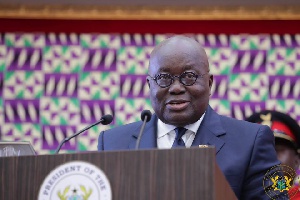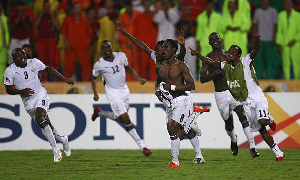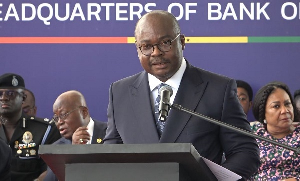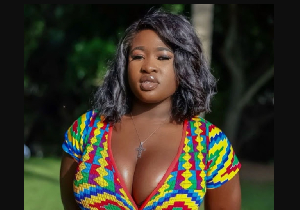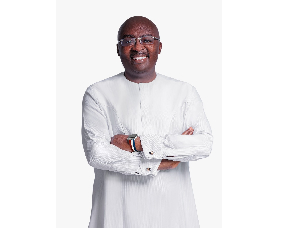President Akufo-Addo, on Thursday, delivered his third State of the National Address (SONA) to Parliament, but did not touch on two major issues on the lips of Ghanaians; the continuous fall of the cedi and the three Takoradi girls, who were kidnapped by a Nigerian, with their whereabouts unknown.
The local currency is not faring well currently against most international currencies, it is exchanging at Five Cedis Twenty Eight pesewas (GH¢5.28) to one United States Dollar, Six Cedis Fifty Four pesewas (GH¢ 6.54) to the Pound Sterling and Five Cedis Sixty Eight pesewas (GH¢5.68) to the Euro.
The cost of living, has been running high with the prices of goods and services going up by the day.
Indeed, many traders, including those in Okaishie, Agbogbloshie, Abossey Okai markets and others, who rely on these international currencies for trading were disappointed in the failure of the President to mention it and give assurances, could be a low point in his address, as far as the traders were concerned.
15-year old Priscilla Mantebea Koranchie and 18-year old Ruth Love Quayson went missing in December last year, whilst 21-year old Priscilla Blessing Bentum went missing as far back as August last year, but both the Western Regional Police and the Takoradi Divisional Police, have not made any significant inroad into those behind the kidnapping, aside the arrest of 28-year-old Samuel Udoetuk Wills, the suspected kidnapper.
Interestingly, despite the national uproar, President Akufo-Addo, has not spoken about the incident and offer hope to the girls families on what the security agencies were doing in tracing and rescuing the three girls and arresting those behind the kidnapping, and his failure to mention it at the SONA, could be disappointing to their relatives who been holding vigils and press engagements to have their girls back.
On other issues, the President, said tax exemption policy, has proving to be an Achilles heel and a growing menace to fiscal stability and revenue generation in the country.
“Revenue mobilization poses the biggest challenge in the management of our economy with the tax exemption policy, in particular, proving to be an Achilles heel and a growing menace to fiscal and revenue generation.”
According to the President, in the last eight years, tax exemptions in respect of import duty, import VAT, import NHIL and domestic VAT, have grown from GH¢392 million, that is 0.6percent of GDP in 2010, to GH¢4.66 billion, that is 1.6percent of GDP in 2018.
These figures do not include exemptions from the payment of corporate and individual income taxes, concessions on tax rates, petroleum tax reliefs, customs tax exemptions enjoyed by diplomatic missions, and waiver of processing charges at the ports.
“If we continue at this rate, in less than sixteen years, half of Ghana’s revenue base will be given away as tax exemptions.”
He added, “We intend to do something about tax exemptions, by introducing suitable measures that may disrupt the easy and comfortable arrangements that many have become accustomed to, but which we have to take to ensure that we have the firmest of foundations for the economic take-off that has escaped us for so long.
President Akufo-Addo reiterated his government’s commitment to maintaining the needed discipline to ensure that Ghana does not return to the International Monetary Fund (IMF) for the 17th time.
A team from the IMF this week completed the 7th and 8th reviews under the Extended Credit Facility program which Ghana entered into in 2015. An approval from the IMF board in March should lead to Ghana exiting the program after April 3rd.
And delivering his State of the Nation Address, President Akufo-Addo stated that in order not to repeat the cycle of returning to the Fund immediately after exiting, Ghana will have to ensure that systems put in place like the Fiscal Council, which are to ensure discipline in the management of the economy, are as effective as possible.
“We’ve just concluded the program with the IMF and with continued discipline, we shall sign off from the deal in April. This is the 16th time Ghana has had to go to the IMF in its history. Mr. Speaker we cannot make the progress we all desire unless we are consistent and disciplined in the management of our economy. We have gone through another round of painful impositions to get to where we are today with healthy fundamentals.”
The President added that a repeat of actions that led to a return to the IMF in the past will not be repeated under his government.
“As we prepare to exit from the IMF program we expect the impressive figures and good performance to continue. We are very much aware that this is not the first time we have had such good a set of figures, but we’re determined to do things differently this time around.
We’ve imposed on ourselves fiscal discipline, we’re paying off legacy debts and deepening good governance practice and business confidence is growing. We will maintain the discipline and bring progress to our country.”
Sanitation in the country has improved significantly since President Akufo-Addo promised to make Accra the cleanest city in 2017.
This is the assessment of President Akufo-Addo more than a year after he made the declaration.
According to him, although there is a lot more the government can do to ensure that the target is met, it has currently achieved significant results in improving sanitation in the country.
“Last year, I reiterated before you, my pledge of improving sanitation in the country and making Accra the cleanest city in Africa by the end of my term. Mr. Speaker, there has been a significant improvement in sanitation even though I acknowledge that more can be done.”
He said the country had increased the capacity of solid waste it manages from 16% to 53%, noting that the government in 2018 alone constructed more than 35,000 household toilets to deal with open defecation.
“This is currently the state of play, we are witnessing increase of the average of solid waste management to 16% to 53% and over the course of last year, 35,862 household toilets were built as oppose to 1,698 in 2016,” he said.
Akufo-Addo expressed displeasure at the incident of open defecation in the country which he said should not be the case in 2019.
He said such conduct was undeserving of Ghanaians and must be eschewed.
The president said the government was working to enforce sanitation by-laws and deal with persons who flout it.
In 2018, President Akufo-Addo decried filth which he said had engulfed the country’s capital cities.
He further disclosed that a GH¢ 200 million had been earmarked to address the issue of filth, especially in Accra urgently.
“We are putting GH¢ 200m into addressing the sanitation challenges that we have. I am confident that by the time I come back next year, appreciable gains would have been made in improving our sanitation,” he said.
President Akufo-Addo, also has added his voice to calls by various civil society groups and international agencies for the two major political parties in the country to disband their vigilante groups.
Delivering his 2019 State of the Nation Address in Parliament, he said he had instructed the leadership of the New Patriotic Party (NPP) which he belongs to, to extend an invitation to the opposition National Democratic Congress (NDC) to discuss how to disband their respective vigilante groups.
Akufo-Addo said the phenomenon of political vigilantism has the potential of destabilizing the country and reversing the democratic gains the country has made over the years.
“I want to use the platform of this Message to make a sincere, passionate appeal to the leaders of the two main political parties in our country, NPP and NDC, to come together, as soon as possible, preferably next week, to agree on appropriate measures to bring an end to this worrying and unacceptable phenomenon of vigilantism in our body politic,” he said.
Citing the recent violence that marred the Ayawaso West Wuogon constituency due to activities of supposed politically-aligned vigilante groups, President Akufo-Addo, promised to use legislation to stop the phenomenon of political vigilantism if the two parties fail to stop it voluntarily.
“I have asked the leadership of the NPP to extend an invitation to the leadership of the NDC for such a meeting. The security services of the country will be on standby to assist this meeting… If voluntary disbandment by the parties is not feasible, then I will initiate legislation on the matter. Vigorous debate and the exchange of ideas should be the true basis of political dialogue and competition in our country, not the activities of party vigilante groups,” he added.
The phenomenon of vigilantism has become a topical issue in the country following a surge in acts of physical attacks and assaults carried out by members of vigilante groups aligned to Ghana’s major political parties, NDC and NPP.
Some of these attacks have resulted in death and injuries on victims including innocent citizens.
Recently, the presence of some masked and armed men at a polling station during the Ayawaso Wuogon by-election sparked conversations on the matter.
General News of Sunday, 24 February 2019
Source: theheraldghana.com





